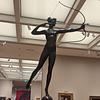Take a photo of a barcode or cover
The Souls of Black Folk is a seminal text of American literature broadly and critical race theory specifically. In it, Du Bois crafts language that has long survived his death. His notion of double consciousness is perhaps his greatest legacy. In “Of Our Spiritual Strivings,” he defines the concept as “this sense of always looking at one’s self through the eyes of others, of measuring one’s soul by the tape of a world that looks on in amused contempt and pity” (7). Du Bois’ idea of twoness, of balancing Americanness and Blackness, is reflected in everywhere from Frantz Fanon’s Black Skin, White Masks to Jordan Peele’s Get Out.
However, there exists some merit to the argument that Du Bois’ paradigm reinforces patriarchal ideals. The Souls of Black Folk has undertones of masculinity, almost in an over-compensating way. I bring this up because I’ve noticed similar rhetoric used by other 19th century Black male writers. Specifically, The Black Phalanx by Joseph T. Wilson, a nonfiction record of Black soldiers in early American wars, seems heavily preoccupied with proving how Black men manifest the same masculine traits as white men. Like Wilson, Du Bois reinforces gender to elevate the status of the Black man. And Du Bois, in spite of himself, explains why this urgency subsists. The Emancipation freed “black men emasculated by a peculiarly complete system of slavery, centuries old; and now, suddenly, violently, they come into a new birthright” (20). Du Bois, Wilson, and other male contemporaries are fighting for their place in society alongside landowning white men. They have internalized the patriarchy and translated it into black hypermasculinity. In essence, their perceived and real emasculation feeds into a cycle of oppression wherein Black men, kicked down by the white man, in turn kick down those “below” them, ie., Black women and queer Black people.
However, there exists some merit to the argument that Du Bois’ paradigm reinforces patriarchal ideals. The Souls of Black Folk has undertones of masculinity, almost in an over-compensating way. I bring this up because I’ve noticed similar rhetoric used by other 19th century Black male writers. Specifically, The Black Phalanx by Joseph T. Wilson, a nonfiction record of Black soldiers in early American wars, seems heavily preoccupied with proving how Black men manifest the same masculine traits as white men. Like Wilson, Du Bois reinforces gender to elevate the status of the Black man. And Du Bois, in spite of himself, explains why this urgency subsists. The Emancipation freed “black men emasculated by a peculiarly complete system of slavery, centuries old; and now, suddenly, violently, they come into a new birthright” (20). Du Bois, Wilson, and other male contemporaries are fighting for their place in society alongside landowning white men. They have internalized the patriarchy and translated it into black hypermasculinity. In essence, their perceived and real emasculation feeds into a cycle of oppression wherein Black men, kicked down by the white man, in turn kick down those “below” them, ie., Black women and queer Black people.
I picked up this book since Dubois is being extensively covered by Peter Adamson’s and Chike Jeffers’ Africana Philosophy podcast. He is undoubtedly an important US thinker, and it is well worth being acquainted with both him and his ideas.
I debated whether to give the book a 3 or 4 star. The description of the difficulties of African American life under “Jim Crow” is vivid and gives important insights into this period. It’s at its best when telling the stories of individuals. Unfortunately, those stories sometimes veer into over sentimentality. Dubois is no Toni Morrison (although apparently he was an influence on her and many other Black American writers).
Dubois has many interesting ideas, which he doesn’t spend enough time elaborating on in this book. He also is a man of his times, and he is influenced by contemporaneous ideas on “race character”, which often makes his thoughts sound quaint, or worse, even racist.
As for his bone to pick with Washington, which he spends a lot of time on in this book, listen to the podcast to get some alternative views and insights on these two men and their ideas (and a whole lot more besides).
Despite my giving it 3 stars, I still would recommend reading it
I debated whether to give the book a 3 or 4 star. The description of the difficulties of African American life under “Jim Crow” is vivid and gives important insights into this period. It’s at its best when telling the stories of individuals. Unfortunately, those stories sometimes veer into over sentimentality. Dubois is no Toni Morrison (although apparently he was an influence on her and many other Black American writers).
Dubois has many interesting ideas, which he doesn’t spend enough time elaborating on in this book. He also is a man of his times, and he is influenced by contemporaneous ideas on “race character”, which often makes his thoughts sound quaint, or worse, even racist.
As for his bone to pick with Washington, which he spends a lot of time on in this book, listen to the podcast to get some alternative views and insights on these two men and their ideas (and a whole lot more besides).
Despite my giving it 3 stars, I still would recommend reading it
“The problem of the twentieth century is the problem of the color line” duBois write in the Soul of Black Folk. He wrote that at the beginning of the twentieth century in 1903. So much was to come and he was instrumental in bringing it about.
These essays are powerful and read like great literature. Du Bois portraits are vivid, the century that separates us from this work dissolves away and we can almost touch the people he writes about. It would be a mistake to think this flowery language betrays a lack of scientific rigour. He had data that he carefully collected. This was presented in Paris in 1900 with some astonishingly creative graphs.
This book eloquently lays out the case for black suffrage, education and equality in time where the prevailing wisdom was that African Americans were too simple for such things.
The latter chapters are more portraits of individuals which makes them most moving. There includes a short chapter on the death of Du Bois first born son. He had died of diphtheria; the white doctor would not treat him. It’s a short chapter but the pain and grief within it would drown the world.
Du Bois would not live to see the passing of the civil rights acts. So much has changed and not changed.
These essays are powerful and read like great literature. Du Bois portraits are vivid, the century that separates us from this work dissolves away and we can almost touch the people he writes about. It would be a mistake to think this flowery language betrays a lack of scientific rigour. He had data that he carefully collected. This was presented in Paris in 1900 with some astonishingly creative graphs.
This book eloquently lays out the case for black suffrage, education and equality in time where the prevailing wisdom was that African Americans were too simple for such things.
The latter chapters are more portraits of individuals which makes them most moving. There includes a short chapter on the death of Du Bois first born son. He had died of diphtheria; the white doctor would not treat him. It’s a short chapter but the pain and grief within it would drown the world.
Du Bois would not live to see the passing of the civil rights acts. So much has changed and not changed.
Part of the African American History canon.
I'm glad I listened to this but I have to admit that I went in and out on my ability to focus on the content. It's not very "digestible" and I feel that is largely due to Du Bois' writing style. That's not a complaint, just an observation.
It always amazes me that so much of history remains the same. Du Bois highlights many of the struggles that African Americans faced during his time and they mirror many of today's struggles. I found it particularly interesting that he hit upon the separation of churches. I've heard people call Sunday the most segregated time of the week in America. The fact that the heads of the churches simply refused to have African American spiritual leaders as part of their church congregation is still evident today. In fact, we attend church in a town that has two First Baptists - the "black" one and the "white" one. It's a bit baffling.
I learned a lot from this book and Du Bois' Wikipedia page (don't judge, I wanted to clear up a few points) and I'm glad I read this seminal work.
I'm glad I listened to this but I have to admit that I went in and out on my ability to focus on the content. It's not very "digestible" and I feel that is largely due to Du Bois' writing style. That's not a complaint, just an observation.
It always amazes me that so much of history remains the same. Du Bois highlights many of the struggles that African Americans faced during his time and they mirror many of today's struggles. I found it particularly interesting that he hit upon the separation of churches. I've heard people call Sunday the most segregated time of the week in America. The fact that the heads of the churches simply refused to have African American spiritual leaders as part of their church congregation is still evident today. In fact, we attend church in a town that has two First Baptists - the "black" one and the "white" one. It's a bit baffling.
I learned a lot from this book and Du Bois' Wikipedia page (don't judge, I wanted to clear up a few points) and I'm glad I read this seminal work.
Short Review: Wide ranging series of 15 essays that range from personal to historical to philosophical. This is both clearly rooted in its time (1903) and still prescient. I think this is the first time I have read a whole book by DuBois. I have read some of his individual essays (the talented 10th at least). DuBois has a lyrical writing style that I really love. I want to read more of his writing, but probably after I read a good biography. If anyone has a suggestion I am open to it.
My slightly longer review on my blog is at http://bookwi.se/souls-of-black-folks/
My slightly longer review on my blog is at http://bookwi.se/souls-of-black-folks/
An iconic and insightful account of the Black experience in early 20th century America.
read this now
Everyone should read this book. It is an essential read, a classic, and is still tremendously relevant today. Read this now.
Everyone should read this book. It is an essential read, a classic, and is still tremendously relevant today. Read this now.
challenging
hopeful
informative
inspiring
reflective
slow-paced
Undeniably a great anti-racism classic, though I think it lacks some of Douglass's gripping style.
informative
reflective
slow-paced
This excellent book covers a wide range of topics, such as the participation of black men in the civil war to he development of black folk music. DuBois makes many elegant arguments about why black people deserve their full rights and recognition. Especially interesting to me is his well reasoned takedown of Booker T. Washington’s gradualist approach.





